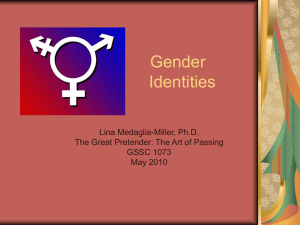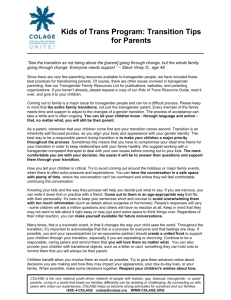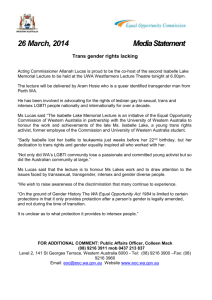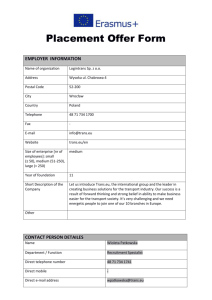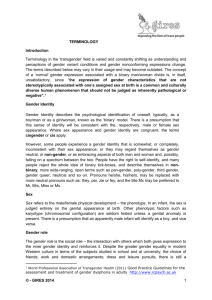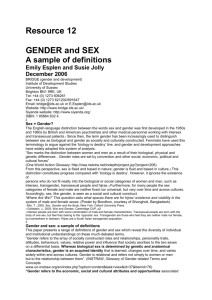Document 10376777
advertisement
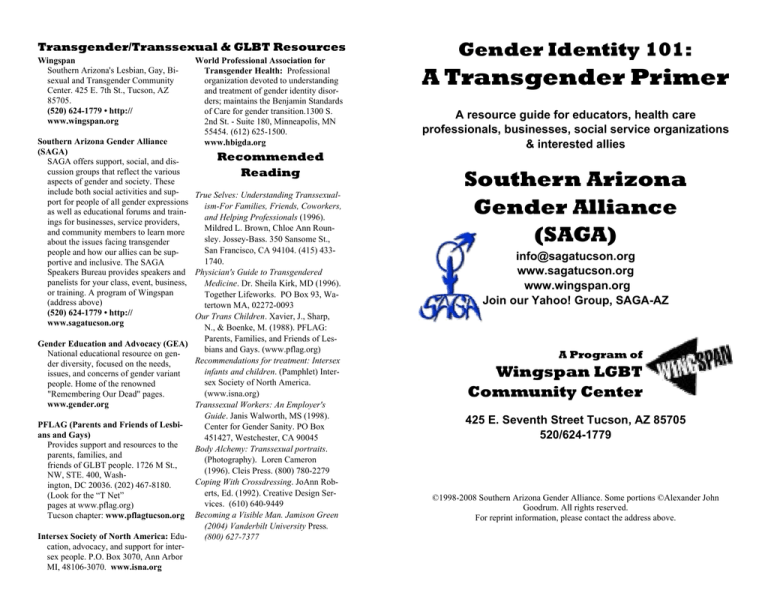
Transgender/Transsexual & GLBT Resources Wingspan Southern Arizona's Lesbian, Gay, Bisexual and Transgender Community Center. 425 E. 7th St., Tucson, AZ 85705. (520) 624-1779 • http:// www.wingspan.org World Professional Association for Transgender Health: Professional organization devoted to understanding and treatment of gender identity disorders; maintains the Benjamin Standards of Care for gender transition.1300 S. 2nd St. - Suite 180, Minneapolis, MN 55454. (612) 625-1500. www.hbigda.org Southern Arizona Gender Alliance (SAGA) Recommended SAGA offers support, social, and discussion groups that reflect the various Reading aspects of gender and society. These include both social activities and supTrue Selves: Understanding Transsexualport for people of all gender expressions ism-For Families, Friends, Coworkers, as well as educational forums and trainand Helping Professionals (1996). ings for businesses, service providers, Mildred L. Brown, Chloe Ann Rounand community members to learn more sley. Jossey-Bass. 350 Sansome St., about the issues facing transgender San Francisco, CA 94104. (415) 433people and how our allies can be sup1740. portive and inclusive. The SAGA Speakers Bureau provides speakers and Physician's Guide to Transgendered panelists for your class, event, business, Medicine. Dr. Sheila Kirk, MD (1996). or training. A program of Wingspan Together Lifeworks. PO Box 93, Wa(address above) tertown MA, 02272-0093 (520) 624-1779 • http:// Our Trans Children. Xavier, J., Sharp, www.sagatucson.org N., & Boenke, M. (1988). PFLAG: Parents, Families, and Friends of LesGender Education and Advocacy (GEA) bians and Gays. (www.pflag.org) National educational resource on genRecommendations for treatment: Intersex der diversity, focused on the needs, infants and children. (Pamphlet) Interissues, and concerns of gender variant sex Society of North America. people. Home of the renowned (www.isna.org) "Remembering Our Dead" pages. www.gender.org Transsexual Workers: An Employer's Guide. Janis Walworth, MS (1998). PFLAG (Parents and Friends of LesbiCenter for Gender Sanity. PO Box ans and Gays) 451427, Westchester, CA 90045 Provides support and resources to the Body Alchemy: Transsexual portraits. parents, families, and (Photography). Loren Cameron friends of GLBT people. 1726 M St., (1996). Cleis Press. (800) 780-2279 NW, STE. 400, WashCoping With Crossdressing. JoAnn Robington, DC 20036. (202) 467-8180. erts, Ed. (1992). Creative Design Ser(Look for the “T Net” vices. (610) 640-9449 pages at www.pflag.org) Tucson chapter: www.pflagtucson.org Becoming a Visible Man. Jamison Green (2004) Vanderbilt University Press. Intersex Society of North America: Edu(800) 627-7377 cation, advocacy, and support for intersex people. P.O. Box 3070, Ann Arbor MI, 48106-3070. www.isna.org Gender Identity 101: A Transgender Primer A resource guide for educators, health care professionals, businesses, social service organizations & interested allies Southern Arizona Gender Alliance (SAGA) info@sagatucson.org www.sagatucson.org www.wingspan.org Join our Yahoo! Group, SAGA-AZ A Program of Wingspan LGBT Community Center 425 E. Seventh Street Tucson, AZ 85705 520/624-1779 ©1998-2008 Southern Arizona Gender Alliance. Some portions ©Alexander John Goodrum. All rights reserved. For reprint information, please contact the address above. What Do All Those Terms Mean? Transgender (or trans) refers to people whose appearance and behavior don't conform to the cultural "norm" for the gender into which they were born. In other words, Trans people, to varying degrees, "transgress" cultural norms as to what a man or a woman "should be". Of course, not all people who transgress cultural norms in regards to gender are, or should be, considered trans as we are discussing here. In that case, that would include a male nurse or a woman who works as a pipe fitter. However, when transgender is used in the case of a "sexual minority", we are generally referring to one of the following five categories: • Transsexuals were born into one gender but identify psychologically and emotionally as the other. Those born physically male but who present as female are called Male to Female or MTFs. Those born female but who present as male are called Female to Male or FTMs. The primary way transsexuals differ from other trans people is that in almost all cases, they seek to modify their bodies through hormonal treatments, Sexual Reassignment Surgery or both. • Cross-dressers identify as, and are completely comfortable with, their physical gender at birth, but will occasionally dress and take on the mannerisms of the opposite gender. Most cross-dressers are heterosexual men . • Drag Performers dress and act like the "opposite" sex for the entertainment of an audience. For them, drag is a job not an identity. Some are gay - some are not. Some identify as transgender - most do not. • Gender blenders, bi-gendered, twospirit, hirja, eunuch, and others - Some trans people find characterizations of gender more limiting than liberating. They may or may not identify as one or the other in a binary gender system and many times will assume a mixture of male and female dress and characteristics, combining elements of both. There’s also intersex people, folks who were born exhibiting some form of “indeterminate” genitalia (subjectively judged so by a doctor to be either a clitoris that is "too large" or a penis that is "too small."), a combination of both male and female genitalia, or ambiguous chromosomes. At birth, the attending physician or parents (or both) "choose" which gender to raise the child, necessitating ongoing surgical and/or hormonal treatments. There are more than 70 types of intersex conditions, and may be present as often as one in every 2000 births. Some argue that transgender is another type of intersex, and it is the brain that is the indeterminate organ. Preliminary research supports this theory, although much more study is needed. Gender Identity vs. Sexual Orientation: What's the Difference? There is a great deal of unnecessary confusion about this. To put it simply, gender identity is who you are; sexual orientation refers to whom you love or are attracted. Some view them as two completely separate concepts. For others, the two are intricately entwined. Either way, what is most important to remember is that a particular gender identity does not necessarily mean a particular sexual orientation. A person who is trans may be gay, lesbian, bisexual or straight. Additionally, there are MTFs who identify as lesbian and FTMs who identity as gay men. People who feel that these categories are too limiting may choose terms such as “queer” to recognize a broader spectrum of genders beyond male and female. Your gender expression is how you show your gender to the world. Gender is engrained in our lives in so many ways you never even think much about—our names, how we dress, walk, speak, communicate, what type of jobs we have, and more. Everyone expresses gender a little differently than the next, but everyone’s gender expression is based on or linked to their internal gender identity as male, female, or androgynous. Hormones & Surgeries For some trans people, hormonal and/or surgical modifications are not necessary in order for them to express their gender identity. Others find that the financial costs are prohibitive, or that they have a physical condition that precludes their being able to take advantage of the procedures. And still others may object to hormonal and/or surgical modifications for personal, spiritual, or political reasons. Of those who do elect to modify their bodies, hormones and gender confirmation surgery (GCS) are typically used. Hormones are controlled substances used to either masculinize or feminize physical characteristics and must be prescribed by a medical doctor. Various surgical procedures are also used by both MTFs and FTMs, ranging in cost from $3,000 to over $100,000 depending upon the procedure. Any medical doctor or psychiatrist can prescribe hormones once they determine their patient is suitable. However, GCS requires highly specialized surgical expertise and should be done only by those experienced in such procedures. In order for a transsexual to receive hormones and GCS, they must, in most cases, go through stringent reviews by medical doctors and psychologists to determine if the person is indeed transsexual and if they are emotionally and psychologically suited for sexual reassignment. These reviews are guided, in some cases, by the Benjamin Standards of Care for Gender Identity Disorders (“The Benjamin Standards”). Issues Facing Transgender People • Few communities include "gender identity" or "gender expression" in their civil rights protections. (Tucson does!) • Most insurance plans specifically exclude coverage for GCS, hormones, counseling and electrolysis, forcing trans people to cover all these expenses out of pocket. • Of the fifty states, only a handful protect trans people from job and housing discrimination; thus unemployment and underemployment rates are high. • Trans youth living on the streets are more likely than other youth to engage in prostitution or consensual sex with a variety of partners without using safe sex techniques. ... Just the tip the iceberg! How Can I Be an Ally to Gender-Diverse People? • It is extremely important to refer to a • • • • trans person by the pronoun appropriate to their presented gender, mostly easily cued by what the person is wearing.. When in doubt, ask which pronoun is preferred. Always use the person’s preferred name regardless of legal documents. NEVER use the word "it" when referring to someone who is transgender, either in their presence or to others when they are not present. To do so is incredibly insulting and disrespectful. Do NOT "out" someone (tell others that they are trans) without his or her permission. Also, do not assume that everyone knows. Some trans people pass very well and the only way someone would know would be if they were told. The decision to tell someone about their personal history should be left to the individual. In some situations, it can also be seen as a violation of privacy laws. Never ask a trans person how he or she has sex or what their genitals look like. Do NOT assume a trans person is straight. Do not assume they are gay, lesbian or bisexual, either. Bottom line: do unto others as you would have them do unto you.
